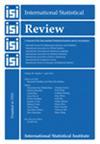On Frequency and Probability Weights: An In‐Depth Look at Duelling Weights
IF 1.8
3区 数学
Q1 STATISTICS & PROBABILITY
引用次数: 0
Abstract
SummaryProbability weights have been widely used in addressing selection bias arising from a variety of contexts. Common examples of probability weights include sampling weights, missing data weights, and propensity score weights. Frequency weights, which are used to control for varying variabilities of aggregated outcomes, are both conceptually and analytically different from probability weights. Popular software such as R, SAS and STATA support both types of weights. Many users, including professional statisticians, become bewildered when they see identical estimates, but different standard errors and ‐values when probability weights are treated as frequency weights. Some even completely ignore the difference between the two types of weights and treat them as the same. Although a large body of literature exists on each type of weights, we have found little, if any, discussion that provides head‐to‐head comparisons of the two types of weights and associated inference methods. In this paper, we unveil the conceptual and analytic differences between the two types of weights within the context of parametric and semi‐parametric generalised linear models (GLM) and discuss valid inference for each type of weights. To the best of our knowledge, this is the first paper that looks into such differences by identifying the conditions under which the two types of weights can be treated the same analytically and providing clear guidance on the appropriate statistical models and inference procedures for each type of weights. We illustrate these considerations using real study data.关于频率和概率权重:对决权重的深入探讨
摘要概率权重已被广泛用于解决各种情况下产生的选择偏差。概率权重的常见例子包括抽样权重、缺失数据权重和倾向得分权重。频率权重用于控制汇总结果的不同变异性,在概念和分析上都不同于概率权重。R、SAS 和 STATA 等流行软件都支持这两种类型的权重。当包括专业统计人员在内的许多用户看到相同的估计值,但当概率权重被视为频率权重时,却有不同的标准误和-值时,他们会感到困惑。有些人甚至完全忽略了这两种权重的区别,将它们视为相同的权重。尽管存在大量关于每种权重类型的文献,但我们几乎没有发现对这两种权重类型和相关推断方法进行正面比较的讨论。在本文中,我们将揭示参数和半参数广义线性模型(GLM)中两种权重在概念和分析上的差异,并讨论每种权重的有效推断方法。据我们所知,这是第一篇研究这种差异的论文,它确定了在哪些条件下可以对两类权重进行相同的分析处理,并就每类权重的适当统计模型和推断程序提供了明确的指导。我们使用实际研究数据来说明这些考虑因素。
本文章由计算机程序翻译,如有差异,请以英文原文为准。
求助全文
约1分钟内获得全文
求助全文
来源期刊

International Statistical Review
数学-统计学与概率论
CiteScore
4.30
自引率
5.00%
发文量
52
审稿时长
>12 weeks
期刊介绍:
International Statistical Review is the flagship journal of the International Statistical Institute (ISI) and of its family of Associations. It publishes papers of broad and general interest in statistics and probability. The term Review is to be interpreted broadly. The types of papers that are suitable for publication include (but are not limited to) the following: reviews/surveys of significant developments in theory, methodology, statistical computing and graphics, statistical education, and application areas; tutorials on important topics; expository papers on emerging areas of research or application; papers describing new developments and/or challenges in relevant areas; papers addressing foundational issues; papers on the history of statistics and probability; white papers on topics of importance to the profession or society; and historical assessment of seminal papers in the field and their impact.
 求助内容:
求助内容: 应助结果提醒方式:
应助结果提醒方式:


